Syria: WFP cash grants backed by EU help families shop for the food and essentials they need
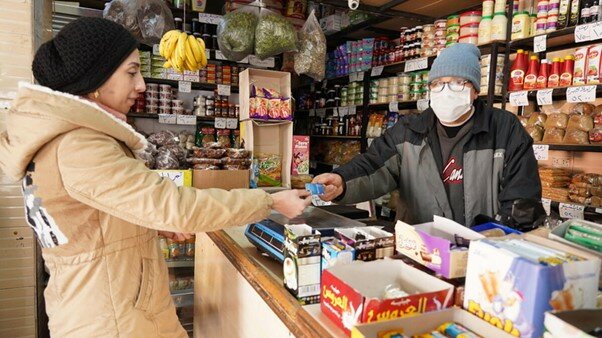
Funding from the European Union is helping Syrian families to boost their nutrition at a critical time with a combination of food and cash assistance.
At a small supermarket in Hama, Rubin’s trying to balance a tray of eggs in one hand and a bag of eggplants in another. Fruit, vegetables and yoghurt are on her list today – items that few Syrian families can currently afford.
When she arrives home, she starts to cook some of the food she has bought. Today her husband and three daughters have an omelet and fresh vegetables, items that have been beyond the family’s reach for years.
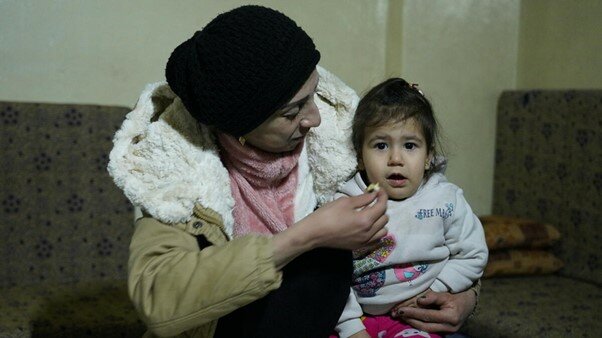
Since she was four months pregnant, Rubin has been using a card from the World Food Programme to buy fresh foods at a store close to home. In addition, she also receives a package of staple foods – oil, rice and sugar – to cover her basic needs.
Combined, these foods have given her critical nutrition during one of the most important times of her life – while pregnant and breastfeeding her 15-month-old daughter, Celin. They also provided vital support to her husband Mazen and two daughters, aged 10 and 12.
“My daughter means the world to me,” says Rubin. “I feel heartfelt happiness that we are receiving this support. It really is helping us cope with our lives after all what we’ve been through.”
When Rubin realised she was pregnant with baby Celin, what should have been a happy time for this family in Hama became deeply stressful. Each month, food at the markets was increasing in price. Rents were soaring and Rubin and her husband could barely afford to feed their two children. Another child would push them beyond their limits.
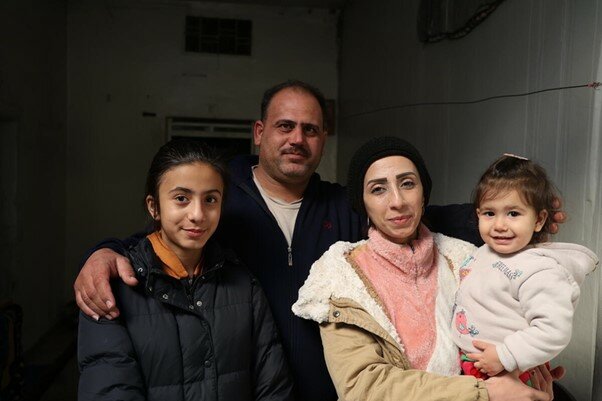
“I knew I wouldn’t be able to feed or medicate her,” says Rubin, whose health was already poor. The family was unable to afford nutritious food, and they were all affected.
“Over the years, my children were gradually deprived from whole categories of food such as dairy products and eggs,” says Rubin. “My doctor told me that I had a calcium deficiency and that I needed a daily intake of dairy products to stop it from worsening. But that wasn’t affordable for me.”
She adds: “The doctor said that he would prescribe calcium pills for me, but it wouldn’t be effective if not taken with the proper food intake. It’s just a supplement.”
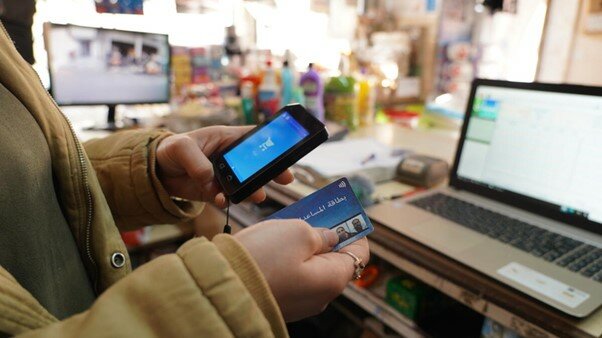
With another baby on the way, it was more critical than ever that Rubin could access healthy food.
Rubin has always loved being a mother. Before the conflict began, her and Mazen had two children, Marah and Yamar and they wanted to have a third.
“Things deteriorated a lot from when I had my first two children. Living expenses used to be affordable, but now salaries are not even close to catching up with the skyrocketing prices,” Rubin explains.
When the conflict began, she and Mazen decided to put their plans for a growing family on hold. A decade later, finding out she was pregnant with Celin was unexpected news.
“When I thought of my baby, I would get worried about the way she’s going to live. I can’t afford to feed her, buy her baby diapers. What if she gets sick? How am I going to medicate her? I knew I wouldn’t be able to raise a child amid our dire conditions.”
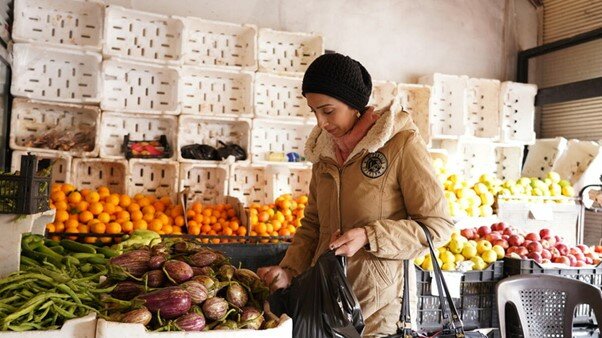
The family already received a monthly food parcel from WFP. When she was asked if she would like to switch and receive a combination of food and an electronic voucher to buy the food she needed, she knew it was the right decision.
“I knew that with the voucher, I would be more capable of managing my family’s nutrition needs compared to receiving pure food assistance,” she says.
“I started to get my children eggs, yoghurt ... and vegetables. Things that are not available in the food parcel.”
Rubin is still breastfeeding Celin and has used the voucher to add fresh foods into her daughter’s diet.
People with disabilities day in Syria: ‘I want to become an engineer’
“If it wasn’t for the cash assistance, I wouldn’t have been able to afford to feed her solid foods without taking this food away from her sisters,” says Rubin who is now able to use her income to buy baby diapers and cleaning products. “This card covered some life expenses for me.”
The World Food Programme currently supports 37,000 families across Syria to access a combination of general food assistance and cash-based transfers each month. This is made possible thanks to generous support from the European Union.
Learn more about WFP's work in Syria
